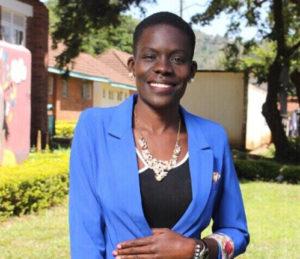Moraa Beryl, 23, lives in Kisumu, Kenya, and is the leader and founder of She Deserves to Soar. She spends her days traveling across Kenya, speaking with and mentoring adolescent girls and young women. She is a 2019 Zuri Award honoree. The awards recognize Kenyan women dedicated to creating positive change in their communities.

What inspired you to found She Deserves to Soar?
I got inspired by my background. I was born to a teenage mother who dropped out of school and has struggled to raise her children single-handedly (even though she is married). My mother is my greatest inspiration and the reason why I am in the sexual and reproductive health and rights field. I grew up in a community where the education of girls is not a priority, seeing very brilliant girls’ dreams shattered because they had to drop out of school from pregnancy or lack of fees. I was also raised in a humble and domestically violent family. Many times I would ask myself, how many teenage girls are in situations like mine? How are they coping? Do they have anyone to talk to? Because I didn’t have anyone to talk to.
Out of these questions I vowed to reach out to girls. I started She Deserves to Soar while I was in my second year at Maseno University. Together with a few of my friends, we offered voluntary counselling services, and we would buy girls sanitary towels and hold girl-talks during school holidays. Today, She Deserves to Soar focuses on adolescent girls and young women and works on SRHR-related issues—particularly on menstrual hygiene management and family planning. We do mentorship and training, as well as advocacy.
What is your favorite part of SRHR work?
Holding community/youth education and sensitizations forums. I love these sharing and learning sessions, especially when parents (and particularly mothers) call me aside to ask more questions on how to engage their daughters in sex and sexuality conversations. And I love it when school girls keep asking one question after another about SRHR related issues. Time is never enough for us!
What are the best/most challenging aspects of working with young people?
The best parts are when we sit down together in a circle and share our experiences and learn from one another’s stories. There is so much energy, flow of ideas and honesty. Trust me, we get solutions to our problems as young people each time. The most challenging part is getting young people to open up and speak freely. They tend to hide a lot at times. But honestly, when the atmosphere is conducive, it’s hard to stop the conversation once it starts.
How did you come to work in partnership with Ipas?
I started my collaboration with the Ipas Africa Alliance while in my second year of university. Ipas held an outreach event for the commemoration of the World Contraceptive Day. Throughout the session I helped with mobilizing participants and getting them registered. I was also one of the presenters, and afterwards the event coordinator asked if I wanted to learn more about SRHR advocacy. That was how I got my start to become the passionate youth champion I am today!
You recently took part in an “intergenerational dialogue” in Kakamega. What was the purpose of that meeting, and what kinds of issues and questions did young people have with respect to abortion and contraception?
Intergenerational dialogues bring people of different ages and genders together to talk, listen to and learn from each other. Everyone has their say. Everyone’s opinions are respected.
In Kakamega, we explored and discussed the social norms and values that are limiting access to sexual and reproductive health information and services, including safe abortion. In the conversation I facilitated with young people, they said that one of their main challenges is that they face so much stigma and discrimination from community members on issues related to sexual and reproductive health. They want more community education and sensitization—and they want to be part of developing and implementing policies to expand access to safe abortion and other reproductive health services. The fact that they are willing to speak out and get involved in finding a solution—that inspires me and keeps me going!
For more information, contact [email protected].

